Germany
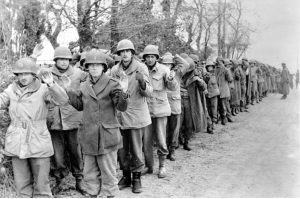 For as long as there have been wars, there have been prisoners of war. Obviously, part of the reason was to take those soldiers out of the fighting. If you are fighting against less enemy combatants, you have a better change of winning. It was a simply a part of war. Both sided took prisoners, and both sides knew that the other side was going to take prisoners. It was not the fact that prisoners were taken, but rather the way they were treated that made this part of war ugly sometimes.
For as long as there have been wars, there have been prisoners of war. Obviously, part of the reason was to take those soldiers out of the fighting. If you are fighting against less enemy combatants, you have a better change of winning. It was a simply a part of war. Both sided took prisoners, and both sides knew that the other side was going to take prisoners. It was not the fact that prisoners were taken, but rather the way they were treated that made this part of war ugly sometimes.
I’m sure that if there was work to do, it made sense to use the prisoners of war 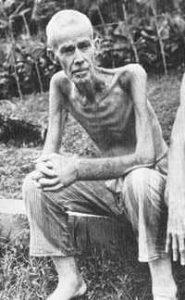 as, basically slave labor…make them earn their keep, so to speak, but often they were beaten, starved, overworked to the point of exhaustion, and basically treated like they were sub-human. Some nations were worse than others. And sometimes, the prisoners of war, weren’t even combatants, but civilians taken hostage for a variety of reasons…most of which had nothing to do with them being a danger in battle. Of course, from about the time of the Vietnam war, it became harder to tell if someone was a “combatant” or not. When children were sent out to interact with soldiers…bombs strapped to their chest…soldiers had to learn to be less than hospitable to the little ones too.
as, basically slave labor…make them earn their keep, so to speak, but often they were beaten, starved, overworked to the point of exhaustion, and basically treated like they were sub-human. Some nations were worse than others. And sometimes, the prisoners of war, weren’t even combatants, but civilians taken hostage for a variety of reasons…most of which had nothing to do with them being a danger in battle. Of course, from about the time of the Vietnam war, it became harder to tell if someone was a “combatant” or not. When children were sent out to interact with soldiers…bombs strapped to their chest…soldiers had to learn to be less than hospitable to the little ones too.
I understand the need for prisoners of war, when the war is still going on, but what is appalling is the treatment of the prisoners sometimes, and the refusal to give the prisoners back at the end of the conflict. Vietnam was also one of the times when prisoners were held long after the war. I know that sometimes the reasons for holding prisoners is that the opposing government refuses to abide by the conditions of the 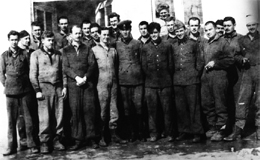 surrender of the losing side. Still, sometimes, the prisoners were held, for no legitimate reason, and for far longer than was reasonable. After World War II, the western Allies released their final prisoners in 1948, but many German POWs in the USSR were held for several more years. Most were used as slave labor in copper or coal mines, and anywhere between 400,000, and up to one million eventually died while in Russian custody. Some 20,000 former soldiers were still in Soviet hands at the time of Joseph Stalin’s death in 1953, and the last 10,000 didn’t get their freedom until 1955 and 1956 a full decade after the war had ended. That seems completely unconscionable to me, but then I’m not part of an evil nation.
surrender of the losing side. Still, sometimes, the prisoners were held, for no legitimate reason, and for far longer than was reasonable. After World War II, the western Allies released their final prisoners in 1948, but many German POWs in the USSR were held for several more years. Most were used as slave labor in copper or coal mines, and anywhere between 400,000, and up to one million eventually died while in Russian custody. Some 20,000 former soldiers were still in Soviet hands at the time of Joseph Stalin’s death in 1953, and the last 10,000 didn’t get their freedom until 1955 and 1956 a full decade after the war had ended. That seems completely unconscionable to me, but then I’m not part of an evil nation.
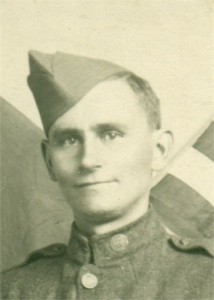 The United States is often called the Sleeping Giant. In the past, the United States has been known as the most powerful country in the world…back in the good old days, that is. Now China, Japan and Russia are also considered to be powerful countries where nuclear weaponry is concerned. The dollar was also the powerful currency, then and even now. The president of the United States was always considered the most powerful person, and I think still is today, or is moving back into that position. All these things considered, the United States was definitely a sleeping giant, because if it woke up it would do everything in its power to rectify things around the globe. As we saw on September 11, 2001, when terrorists attacked our country. Like Toby Keith sang in his song Courtesy Of The Red, White, And Blue (The Angry American), “Justice will be served, and the battle will rage. This big dog will fight when you rattle his cage. And you’ll be sorry that you messed with the U.S. of A” That is notoriously the way the United States has been when it comes to world conflict…slow to anger, but once we are in a war…we are in it to win it!
The United States is often called the Sleeping Giant. In the past, the United States has been known as the most powerful country in the world…back in the good old days, that is. Now China, Japan and Russia are also considered to be powerful countries where nuclear weaponry is concerned. The dollar was also the powerful currency, then and even now. The president of the United States was always considered the most powerful person, and I think still is today, or is moving back into that position. All these things considered, the United States was definitely a sleeping giant, because if it woke up it would do everything in its power to rectify things around the globe. As we saw on September 11, 2001, when terrorists attacked our country. Like Toby Keith sang in his song Courtesy Of The Red, White, And Blue (The Angry American), “Justice will be served, and the battle will rage. This big dog will fight when you rattle his cage. And you’ll be sorry that you messed with the U.S. of A” That is notoriously the way the United States has been when it comes to world conflict…slow to anger, but once we are in a war…we are in it to win it!
The same held true for the other wars we have been in. We might not jump in early, but when we do…look out. On this day, April 6, 1917, the United States Senate voted 82 to 6 to declare war against Germany, the United 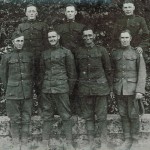 States House of Representatives endorses the declaration by a vote of 373 to 50, and America formally entered World War I. This action would be the one that would send my grandfather, George Byer to war. He was 24 years old. Grandpa didn’t talk much about his time in the war…at least not that I remember. I think that most of the men who came home after fighting in a war, are just happy to be home. They want to put it all behind them, and move forward with their lives, knowing that if it was ever necessary he would go back again. He was a patriot, and that was what patriots did. In fact, when the time came for the men to register for the “old man draft” of World War II…a time when men up to the age of 65 were required to register for the draft, Grandpa was honored to register, as were the other men between the ages of 45 and 65. These men felt like their time of usefulness was over, and when they were told that they were needed again, even if it was just for work on the home front, they all jumped at the chance to serve.
States House of Representatives endorses the declaration by a vote of 373 to 50, and America formally entered World War I. This action would be the one that would send my grandfather, George Byer to war. He was 24 years old. Grandpa didn’t talk much about his time in the war…at least not that I remember. I think that most of the men who came home after fighting in a war, are just happy to be home. They want to put it all behind them, and move forward with their lives, knowing that if it was ever necessary he would go back again. He was a patriot, and that was what patriots did. In fact, when the time came for the men to register for the “old man draft” of World War II…a time when men up to the age of 65 were required to register for the draft, Grandpa was honored to register, as were the other men between the ages of 45 and 65. These men felt like their time of usefulness was over, and when they were told that they were needed again, even if it was just for work on the home front, they all jumped at the chance to serve.
As for World War I, Grandpa would serve, and he would come home. Then, he would go on to live a long life…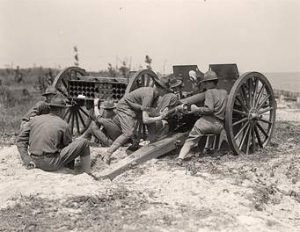 forever changed from the man he once was, because you see, war changes a man. They are changed by what they see, whether they were required to take a life or not. And if they were required to kill, then kill they would, because The Sleeping Giant had been awakened, and the Big Dog’s cage had been rattled. The United States would go to war, and they would win, along with their alleys, because losing was not an option…not if the world was to remain the kind of place we knew and loved. Germany was an evil empire, and that evil empire had to be stopped. I am very proud of my grandfather’s service, and I’m thankful that the Big Dog fought in this one and the other wars it has fought in. It was an important fight, and we needed to win it.
forever changed from the man he once was, because you see, war changes a man. They are changed by what they see, whether they were required to take a life or not. And if they were required to kill, then kill they would, because The Sleeping Giant had been awakened, and the Big Dog’s cage had been rattled. The United States would go to war, and they would win, along with their alleys, because losing was not an option…not if the world was to remain the kind of place we knew and loved. Germany was an evil empire, and that evil empire had to be stopped. I am very proud of my grandfather’s service, and I’m thankful that the Big Dog fought in this one and the other wars it has fought in. It was an important fight, and we needed to win it.
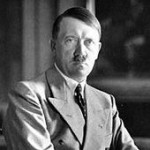
 One would expect that after being defeated in a war, it would be understood that you don’t go up against the same adversary again, but apparently this concept was lost on Adolf Hitler. We all know who Hitler was, and that he was bent on taking over the world. There were things about him that had the people of Germany fooled into thinking that he was going to be a great leader, until his Nazi swastika became the symbol of hate and Anti-Semitism. In late June 1914, Archduke Franz Ferdinand of Austria was assassinated by a Serbian nationalist in Sarajevo, Bosnia. An escalation of threats and mobilization orders followed the incident, leading by mid-August to the outbreak of World War I, which pitted Germany, Austria-Hungary and the Ottoman Empire, called the Central Powers, against Great Britain, France, Russia, Italy and Japan, the Allied Powers. The Allies were joined after 1917 by the United States. The Great War, as it was then known, went on for four long years, and saw unprecedented levels of death and destruction, due mostly to grueling trench warfare and the introduction of modern weaponry such as machine guns, tanks and chemical weapons. By the time World War I ended in the defeat of the Central Powers in November 1918, more than 9 million soldiers had been killed and 21 million more were wounded. It makes me cringe to think of the good men lost because of hatred.
One would expect that after being defeated in a war, it would be understood that you don’t go up against the same adversary again, but apparently this concept was lost on Adolf Hitler. We all know who Hitler was, and that he was bent on taking over the world. There were things about him that had the people of Germany fooled into thinking that he was going to be a great leader, until his Nazi swastika became the symbol of hate and Anti-Semitism. In late June 1914, Archduke Franz Ferdinand of Austria was assassinated by a Serbian nationalist in Sarajevo, Bosnia. An escalation of threats and mobilization orders followed the incident, leading by mid-August to the outbreak of World War I, which pitted Germany, Austria-Hungary and the Ottoman Empire, called the Central Powers, against Great Britain, France, Russia, Italy and Japan, the Allied Powers. The Allies were joined after 1917 by the United States. The Great War, as it was then known, went on for four long years, and saw unprecedented levels of death and destruction, due mostly to grueling trench warfare and the introduction of modern weaponry such as machine guns, tanks and chemical weapons. By the time World War I ended in the defeat of the Central Powers in November 1918, more than 9 million soldiers had been killed and 21 million more were wounded. It makes me cringe to think of the good men lost because of hatred.
In July 1919, just eight months after the end of World War I, the Treaty of Versailles was signed, calling for stiff war reparation payments and other punishing peace terms for a defeated Germany. Having been forced to sign the treaty, the German delegation to the peace conference indicated its attitude by breaking the ceremonial pen. In my mind, that was indicative of what was to come. They felt like they shouldn’t have had to surrender or sign such an agreement, and they were telling the world that at some point they would break that treaty. As dictated by the Treaty of Versailles, Germany’s military forces were reduced to insignificance and the Rhineland, along the western border of Germany, was to be demilitarized. Nazi leader Adolf Hitler, well known for his hatred of authority, and for his lack of good sense as it turns out, would violate the Treaty of Versailles and the Locarno Pact by sending German military forces into the Rhineland just four years later.
By 1923, Adolf Hitler and the Nazi Party had seized full power in Germany, removing the rights of the people to have any say in their lives or in government. Hitler promised vengeance against the Allied nations that had 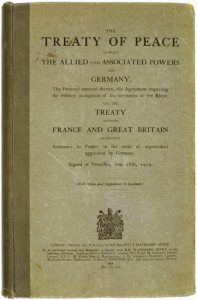
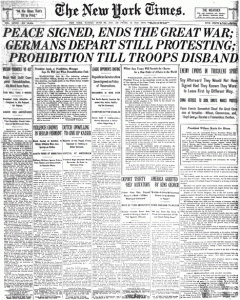 forced the Treaty of Versailles on the German people. In my opinion, the German people had nothing to do with it. The problem with the Treaty of Versailles and the Locarno Pact was Hitler’s on dislike of authority. In 1935, Hitler unilaterally canceled the military clauses of the treaty and in March 1936 denounced the Locarno Pact and began the remilitarizing of the Rhineland. Two years later, Nazi Germany burst out of its territories, absorbing Austria and portions of Czechoslovakia. In 1939, Hitler invaded Poland, leading to the outbreak of World War II in Europe. Hitler would be defeated in World War II, just as he was in World War I, and his suicide and complete show of cowardice would prove that he was not only hateful, but incredibly stupid as well.
forced the Treaty of Versailles on the German people. In my opinion, the German people had nothing to do with it. The problem with the Treaty of Versailles and the Locarno Pact was Hitler’s on dislike of authority. In 1935, Hitler unilaterally canceled the military clauses of the treaty and in March 1936 denounced the Locarno Pact and began the remilitarizing of the Rhineland. Two years later, Nazi Germany burst out of its territories, absorbing Austria and portions of Czechoslovakia. In 1939, Hitler invaded Poland, leading to the outbreak of World War II in Europe. Hitler would be defeated in World War II, just as he was in World War I, and his suicide and complete show of cowardice would prove that he was not only hateful, but incredibly stupid as well.

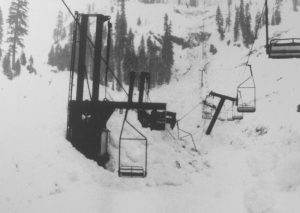 When we think of a series of disasters, it is usually tornadoes, earthquakes, or floods that come to mind. On February 11, 1952, none of the usual suspects were at fault in the series of disasters that began across central Europe. Snow storms don’t normally fall into the category of a series of disasters, but when a storm stalled over middle Europe during the first week of February of 1952, it dumped two feet of snow in parts of France, Austria, Switzerland, and Germany. In the vast area of middle Europe, life quickly ground to a standstill. Everything was closed, and travel was impossible. Germany recruited thousands of people and their shovels in an attempt to make the streets passable. In France several people died when their roofs collapsed under the weight of the heavy snow accumulation.
When we think of a series of disasters, it is usually tornadoes, earthquakes, or floods that come to mind. On February 11, 1952, none of the usual suspects were at fault in the series of disasters that began across central Europe. Snow storms don’t normally fall into the category of a series of disasters, but when a storm stalled over middle Europe during the first week of February of 1952, it dumped two feet of snow in parts of France, Austria, Switzerland, and Germany. In the vast area of middle Europe, life quickly ground to a standstill. Everything was closed, and travel was impossible. Germany recruited thousands of people and their shovels in an attempt to make the streets passable. In France several people died when their roofs collapsed under the weight of the heavy snow accumulation.
The worst of the storm, however, was felt in Austria, when a series od deadly avalanches took a heavy death toll. It was during the early hours of February 11, 1952, at a ski resort in Melkoede, when a huge mass of the newly fallen snow suddenly crashed down the mountain from above. There was no time to react, and no time to get away. They were trapped. Fifty people were sleeping at the resort. Twenty of them, mostly German tourists were killed, and another ten were seriously injured. In Switzerland and Austria, authorities issued urgent warnings about potential avalanches and some villages were actually evacuated. Nevertheless, all that was not enough. The next day there were more damaging avalanches. In Isenthal, Switzerland, hundreds of cattle and several barns were buried by an avalanche. In Leutasche, Austria, a twelve year old child was saved by people who risked their own lives in the face of a second avalanche that was poised to fall. Seven members of the child’s family were killed by the avalanche.
Avalanches kill more than 150 people worldwide each year. Most are snowmobilers, skiers, and snowboarders, and most deadly avalanches are triggered by the victim or someone in their party. Given that count, I suppose that the 78 people who perished in the February avalanches in middle Europe in 1952, might seem like a small number, but when you consider that these deaths occurred over a period of a few days, and the rest of the deaths by avalanches from that year were not included in that number, the death toll is staggering. This was not the worst avalanche death toll, however. That record, if it is right to call it such, goes to the Huascarán avalanche that was triggered by the 1970 Ancash earthquake in Peru. On 31 May 1970, the Ancash earthquake caused a substantial part of the north side of the mountain to collapse. The avalanche mass, an 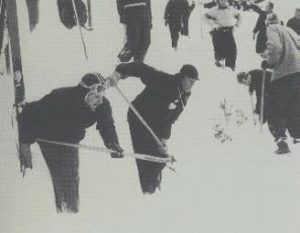
 estimated 80 million cubic feet of ice, mud and rock, was about half a mile wide and a mile long. It advanced about 11 miles at an average speed of 175 to 200 miles per hour, burying the towns of Yungay and Ranrahirca under ice and rock, killing more than 20,000 people. This avalanche, in my estimation, might have been more of a landslide than an avalanche, and so it’s very possible that all of these people would have died had there been snow or not.
estimated 80 million cubic feet of ice, mud and rock, was about half a mile wide and a mile long. It advanced about 11 miles at an average speed of 175 to 200 miles per hour, burying the towns of Yungay and Ranrahirca under ice and rock, killing more than 20,000 people. This avalanche, in my estimation, might have been more of a landslide than an avalanche, and so it’s very possible that all of these people would have died had there been snow or not.
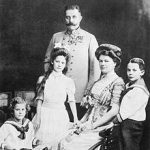
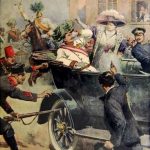 It’s amazing to me that one act of hate can bring so many people to war, but that was what happened with World War I. On June 28, 1914, Archduke Franz Ferdinand of Austria, and his wife, Sophie, Duchess of Hohenberg, were assassinated by a Serbian nationalist in Sarajevo, Bosnia. The assassin, Gavrilo Princip was an ethnic Serb and Yugoslav nationalist from the group Young Bosnia, which was supported by the Black Hand, a nationalist organization in Serbia. The outraged Austrian people and its government threatened mobilization of troops to seek vengeance for their beloved leader and his family.
It’s amazing to me that one act of hate can bring so many people to war, but that was what happened with World War I. On June 28, 1914, Archduke Franz Ferdinand of Austria, and his wife, Sophie, Duchess of Hohenberg, were assassinated by a Serbian nationalist in Sarajevo, Bosnia. The assassin, Gavrilo Princip was an ethnic Serb and Yugoslav nationalist from the group Young Bosnia, which was supported by the Black Hand, a nationalist organization in Serbia. The outraged Austrian people and its government threatened mobilization of troops to seek vengeance for their beloved leader and his family.
The crisis escalated as the conflict between Austria-Hungary and Serbia came to involve Russia, Germany, France, and ultimately Belgium and Great Britain. By mid-August of 1914, the crisis had become a full blown war, with Germany, Austria Hungary and the Ottoman Empire, known as the Central Powers, against Great Britain, France, Russia, Italy and Japan, the Allied Powers. The United States would also enter the war as a part of the Allied Powers in 1917. Other factors came into play during the diplomatic crisis that preceded the war, such as misperceptions of intent in that Germany believed that Britain would remain neutral, the belief that war was inevitable, and the speed of the crisis, which was exacerbated by delays and misunderstandings in diplomatic communications. The four years of the Great War…as it was dubbed…saw unprecedented levels of carnage and destruction, thanks to grueling trench warfare and the introduction of modern weaponry such as machine guns, tanks and chemical weapons. By the time World War I ended in the defeat of the Central Powers in November 1918, more than 9 million soldiers had been killed and 21 million more wounded.
Evil exists in this world, and it gets worse every day, and assassinations are not new. Chanakya, 350–283 BC, an Indian teacher, philosopher and royal advisor, wrote about assassinations in detail in his political treatise Arthashastra. Later, his student Chandragupta Maurya, the founder of the Maurya Empire of India, made use of assassinations against some of his enemies, including two of Alexander’s generals Nicanor and Philip. I suppose it should not be a surprise, yet every assassination brings with it shock, fear, and rage. 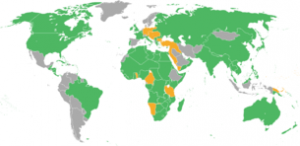
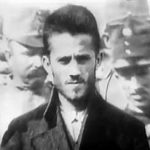 Countless wars have been fought over one nation’s ruler being killed by someone from another nation. War will be a part of our world until the end of time, but that in no way lessens the worry, fear, and sadness that war always brings. Still, like the Allies of World War I, we cannot let one group or nation hold power over another group or nation…which also explains the need to destroy ISIS.
Countless wars have been fought over one nation’s ruler being killed by someone from another nation. War will be a part of our world until the end of time, but that in no way lessens the worry, fear, and sadness that war always brings. Still, like the Allies of World War I, we cannot let one group or nation hold power over another group or nation…which also explains the need to destroy ISIS.
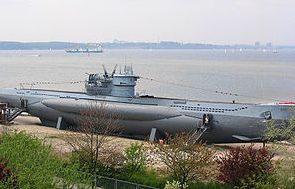 Anytime a soldier goes to war, there is a possibility of that soldier not returning, but some MOS (Military Occupational Specialty) categories were more dangerous than others. The life expectancy of a ball turret gunner in World War II, for instance, was just 12 minutes…yes, that’s right…12 minutes. And these guys didn’t always have a choice as to what job they did. If they were the shortest, they were most likely going to be a ball turret gunner, because of limited space in the ball. Still, while I don’t know the exact number who died, I know it was quite a few. Of course, soldiers on the ground are more at risk than other occupations too. There were the suicide bombers from Japan, who chose to fly their plane right into a ship too, but I think that few occupations were as deadly as that of the U-Boat crew. It wasn’t so much that the occupation was deadly, but rather that every country in the world was after the German U-Boat.
Anytime a soldier goes to war, there is a possibility of that soldier not returning, but some MOS (Military Occupational Specialty) categories were more dangerous than others. The life expectancy of a ball turret gunner in World War II, for instance, was just 12 minutes…yes, that’s right…12 minutes. And these guys didn’t always have a choice as to what job they did. If they were the shortest, they were most likely going to be a ball turret gunner, because of limited space in the ball. Still, while I don’t know the exact number who died, I know it was quite a few. Of course, soldiers on the ground are more at risk than other occupations too. There were the suicide bombers from Japan, who chose to fly their plane right into a ship too, but I think that few occupations were as deadly as that of the U-Boat crew. It wasn’t so much that the occupation was deadly, but rather that every country in the world was after the German U-Boat.
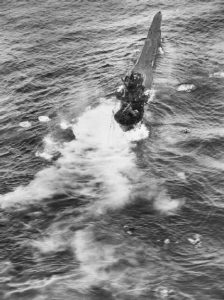
The U-Boat was a German submarine, and they were the best sumbarine the Germans had. There were 40,000 men who were assigned to the German U-Boats during World War II. Of those assigned to the U-Boats, only 10,000 returned. That is a shocking number!! I would never have wanted the Germans to win World War II, but when I think of the soldiers who fought, I’m sure that there were many who disagreed with Hitler, and others who were brainwashed into following him, but they were still soldiers, and people, and they had been given an assignment that was going to most likely get them killed. You see, the German U-Boat was the most feared of all the ships or submarines during World War II. They had a code system that was hard to crack, and they were sinking the Allies ships. They had to go. Once the Allies figured out their code, they could no longer hide. The U-Boats began dropping like flies, and with them…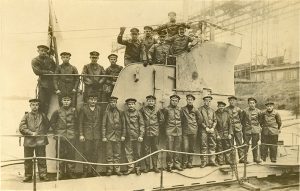 their crews, of course.
their crews, of course.
The U-Boats ran on battery power when they were submerged, and that didn’t last very long. So they were required to be a surface vessel most of the time, operating on their diesel engines. I don’t think that contributed to the U-Boat becoming a target, because as long as their whereabouts was coded, they were relatively safe. Once that safety net was gone, they were in a lot of trouble, as has been proven by the number of casualties. The fate of the crews of the U-Boats was not a good one, and those 30,000 men paid the final price, once that safety net was gone.
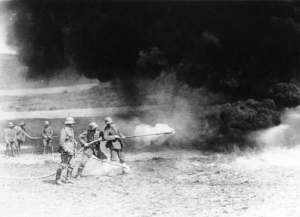 Over the centuries of life on Earth, there have been numerous wars, and numerous weapons of warfare. Yet, few could bring fear to the heart of an infantryman quicker than the Flammenwerfer. Developed by the Germans during World War I, the Flammenwerfer…or Flamethrower, in English…once lit could throw a steady stream of flames 20 to 30 feet in front of it. For the men on the ground, this meant one of two things. They could run…abandoning the relative safety of their foxhole, usually with the result of being shot down by the enemy, or they could stand their ground and be incinerated. It wasn’t much of a choice really, and most ran in the hope of escaping the machine gun fire that would undoubtedly follow the flamethrower. It was a situation of instant death…no matter which choice a soldier made…not to mention the fact that every fiber of a soldier’s being and training told them to stand their ground. This weapon took much of it toll on the soldier’s sense of bravery.
Over the centuries of life on Earth, there have been numerous wars, and numerous weapons of warfare. Yet, few could bring fear to the heart of an infantryman quicker than the Flammenwerfer. Developed by the Germans during World War I, the Flammenwerfer…or Flamethrower, in English…once lit could throw a steady stream of flames 20 to 30 feet in front of it. For the men on the ground, this meant one of two things. They could run…abandoning the relative safety of their foxhole, usually with the result of being shot down by the enemy, or they could stand their ground and be incinerated. It wasn’t much of a choice really, and most ran in the hope of escaping the machine gun fire that would undoubtedly follow the flamethrower. It was a situation of instant death…no matter which choice a soldier made…not to mention the fact that every fiber of a soldier’s being and training told them to stand their ground. This weapon took much of it toll on the soldier’s sense of bravery.
The Flammenwerfer was developed in 1915 by the Germans, and first used in battle against the Allied forces on this day, July 30, 1915 at the Battle of Hooge. Eleven days before that battle, British infantry had captured the German occupied village of Hooge, located near Ypres in Belgium, by detonating a large mine. Using the flamethrowers, along with machine guns, trench mortars and hand grenades, the Germans got their positions 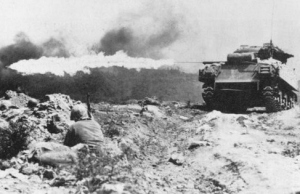 back on July 30, 1915. They broke through enemy front lines with ease, pushing the British forces back to their second trench. Only a few men were lost to actual burns, but a British officer was heard to explain that the weapons had a great demoralizing effect, and when added to the assault of the other powerful weapons, they proved mercilessly efficient at Hooge. I suppose that is true. I can think of few things more demoralizing for a soldier than running from your position in fear. Soldiers don’t take kindly to fear…or running away.
back on July 30, 1915. They broke through enemy front lines with ease, pushing the British forces back to their second trench. Only a few men were lost to actual burns, but a British officer was heard to explain that the weapons had a great demoralizing effect, and when added to the assault of the other powerful weapons, they proved mercilessly efficient at Hooge. I suppose that is true. I can think of few things more demoralizing for a soldier than running from your position in fear. Soldiers don’t take kindly to fear…or running away.
During World War I, the Germans were the only ones to use such a weapon, and not because it was difficult to make. So, why didn’t the Allies us it too? It was one of the great puzzles that emerged from World War I. Why? The British made three attempts with larger, more unwieldy prototypes: the smallest one was equal in size to the German Grof, which the enemy had almost abandoned by 1916. The French were more persistent, and by 1918 had at least seven companies trained in using flamethrowers, and still the use of the weapon never progressed to the same level as that of the German army.
By World War II, however, the flamethrower was the most dramatic hand weapon used by any Army and the most effective for its purpose. But it was during the 20th century that engineers and scientists placed flames 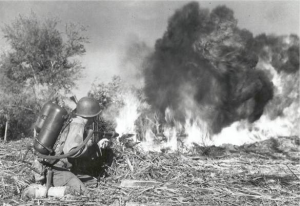 under advanced technological control in an effort to make flamethrowers portable, reliable and reasonably safe…for the user anyway. Prior to that the words “friendly fire” had a second meaning in that flamethrowers could kill the operator while he was doing his best to kill the enemy with it. The result of this new technology was a device with as much psychological impact as it’s lethality impact. That was the chief reason why the United States, Great Britain and other world powers used the flamethrower from World War I through the Vietnam War. Even today, Russia still has flamethrowers in its inventory. I guess it is an important weapon, but for most of us, I think that just the thought of using it on someone would make us seriously ill.
under advanced technological control in an effort to make flamethrowers portable, reliable and reasonably safe…for the user anyway. Prior to that the words “friendly fire” had a second meaning in that flamethrowers could kill the operator while he was doing his best to kill the enemy with it. The result of this new technology was a device with as much psychological impact as it’s lethality impact. That was the chief reason why the United States, Great Britain and other world powers used the flamethrower from World War I through the Vietnam War. Even today, Russia still has flamethrowers in its inventory. I guess it is an important weapon, but for most of us, I think that just the thought of using it on someone would make us seriously ill.
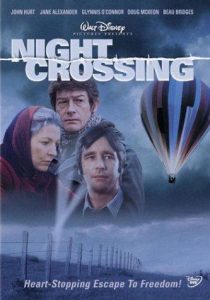
 Years ago, I watched a movie called Night Crossing, which came out in 1982. The movie was based on a true story about two families trapped in East Germany in 1979. The only way they could be free was to escape to the west. Over the years during which Germany was divided, and basically locked down. At first the people felt panic. Many of them had family on the other side, and no way to get to them. It was horrible. Escape attempts while not constant, were met with severe repercussions. I’m sure many people thought that they would always be prisoners in East Germany. Since today marks, the 68th anniversary of the ill fated Soviet blockade of their section of Germany following World War II, I was reminded of the movie I had seen.
Years ago, I watched a movie called Night Crossing, which came out in 1982. The movie was based on a true story about two families trapped in East Germany in 1979. The only way they could be free was to escape to the west. Over the years during which Germany was divided, and basically locked down. At first the people felt panic. Many of them had family on the other side, and no way to get to them. It was horrible. Escape attempts while not constant, were met with severe repercussions. I’m sure many people thought that they would always be prisoners in East Germany. Since today marks, the 68th anniversary of the ill fated Soviet blockade of their section of Germany following World War II, I was reminded of the movie I had seen.
I was so surprised about the elaborate lengths the family had to go to, in order to buy the materials needed to make a hot air balloon, with out arousing suspicions. To buy enough of the silk for the balloon, they had to go to several different locations, and tell the clerks that they were building tents for a scout group to use to go camping. I couldn’t imagine having to lie to a store clerk in order to purchase material, but then I have never lived anywhere, but in a free society, where the individual person had the right to do pretty much what they pleased. That was something that some of the people of that time, in East Germany, had never known.
While the situation was traumatic, I found myself…somehow fascinated with the process, the planning, the forethought, and the tenacity of these families. I found myself rooting for them every step of the way. Rooting for them wasn’t the thing that surprised me, however. It really was how interested I was in all the strategizing, and yes, the danger of it all. I don’t suppose the event felt anything like that to them, however. For them, this was life and death, because if they were caught, they would be killed. They would have one chance to escape, 
 and one chance only. And they still had to make the crossing, and the landing, without getting caught up in the barbed wire fencing, or landing on a fence somewhere. The whole event, while an exciting story for me, was probably an event that they could not wait to put behind them…and I don’t blame them there.
and one chance only. And they still had to make the crossing, and the landing, without getting caught up in the barbed wire fencing, or landing on a fence somewhere. The whole event, while an exciting story for me, was probably an event that they could not wait to put behind them…and I don’t blame them there.
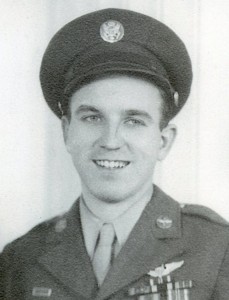 It’s hard for me to think about D-Day, without wondering what things were going through my dad, Allen Spencer’s mind on that day. Each branch of the military had their own part to play and each was in much danger. I suppose it’s possible that the men on the ground were in the most danger, but in reality, anyone who was involved that day faced grave danger. Soldiers could be shot and killed, ships could be sunk, and planes could be shot down. No matter how the attack came, death was often the result, and in battle it was inevitable.
It’s hard for me to think about D-Day, without wondering what things were going through my dad, Allen Spencer’s mind on that day. Each branch of the military had their own part to play and each was in much danger. I suppose it’s possible that the men on the ground were in the most danger, but in reality, anyone who was involved that day faced grave danger. Soldiers could be shot and killed, ships could be sunk, and planes could be shot down. No matter how the attack came, death was often the result, and in battle it was inevitable.
My dad was a young man of just 20 years. That is the age of my two oldest grandchildren, and I simply cannot imagine either of them being in that position. Of course, they could handle it, because twenty year olds have been fighting wars for as long as wars have been fought. It is me, and my mind, that can’t wrap itself around the idea of them being in an airplane providing air support over a battlefield. For my dad, every mission held an adrenalin rush, a degree of excitement, and a large degree of dread, mixed with the need to push back fear. Flying in the B-17G Bomber was an exciting thing for him, but unfortunately it had to 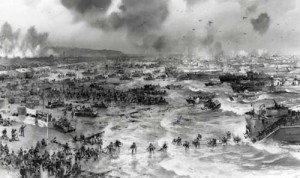 be mixed with the reality of the fact that those bombs were killing people…even if they were the enemy. They often had no say in the matter, they were an enemy of the Allied Forces simply because they lived in the country they did.
be mixed with the reality of the fact that those bombs were killing people…even if they were the enemy. They often had no say in the matter, they were an enemy of the Allied Forces simply because they lived in the country they did.
The air war was vastly different from the ground war, but that didn’t make either more of less dangerous. The Luftwaffe was not widely used on D-Day, but did come racing in over the following days. The weather was bad that first day, and that was definitely to the advantage of the Allied troops. Nevertheless, there were German forces involved, and without air support, they could not have pulled off the victory they did at Normandy. The planes that were there to provide air support, were basically magnets for the  Luftwaffe, and any other enemy forces on the ground. Flying over Normandy was not a task to be taken lightly. Their job was to keep the bombers, tanks, and other soldiers off of the ground troops. The men risked their lives every second that they were in the air. The men on the ground were so vulnerable, and it was imperative that they have good air cover to keep as much enemy fire off of them as possible. It was very clear that without the air support, D-Day would not have been possible.
Luftwaffe, and any other enemy forces on the ground. Flying over Normandy was not a task to be taken lightly. Their job was to keep the bombers, tanks, and other soldiers off of the ground troops. The men risked their lives every second that they were in the air. The men on the ground were so vulnerable, and it was imperative that they have good air cover to keep as much enemy fire off of them as possible. It was very clear that without the air support, D-Day would not have been possible.
I am very proud of the part my dad played in D-Day, as I am of men like my Uncle Jim Wolfe, who was one of those men on the ground on that fateful day. Their job was a very dangerous one, and many of them would not see the sun set that night, but they had a job to do, and so they went out to battle for the freedom of those who were oppressed by the evil that was Hitler. It is a battle we will never forget, nor will we forget the men who fought there, especially those who gave all.
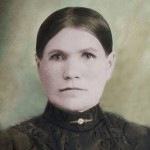 Things were quite different in the 1800s, as most of you know, but sometimes I wonder if we really understand how different they were. In about 1876 or so, my great grandmother, Henriette Schumacher, a girl of about 16 years, was sent by her widowed mother, with her sister to America. Her sister’s husband wanted to immigrate there, and since they had two little daughters, and Great Grandma’s mother was worried about her daughter going so far without help, she decided that since Henriette was not married she should go too. For their mother, there seemed to be safety in numbers, so it had to be better to send two girls instead of just one. I really can’t imagine the heartache she must have felt at that time. When my own daughter, Amy Royce moved to Washington state, I thought my heart would break…and yet I knew I would see her again, and that communication for us would be fairly easy. For my 2nd great grandmother, things were different. She didn’t know if she would see her daughters again, and I have no way to confirm that she did.
Things were quite different in the 1800s, as most of you know, but sometimes I wonder if we really understand how different they were. In about 1876 or so, my great grandmother, Henriette Schumacher, a girl of about 16 years, was sent by her widowed mother, with her sister to America. Her sister’s husband wanted to immigrate there, and since they had two little daughters, and Great Grandma’s mother was worried about her daughter going so far without help, she decided that since Henriette was not married she should go too. For their mother, there seemed to be safety in numbers, so it had to be better to send two girls instead of just one. I really can’t imagine the heartache she must have felt at that time. When my own daughter, Amy Royce moved to Washington state, I thought my heart would break…and yet I knew I would see her again, and that communication for us would be fairly easy. For my 2nd great grandmother, things were different. She didn’t know if she would see her daughters again, and I have no way to confirm that she did.
Still, many people were leaving the old country, in search of a dream life somewhere else. In that way, not much has changed at all. People still move from place to place, and sometimes country to country in search of some exciting new dream life. Some find what they are looking for, and others find out that what they were searching for was right there in front of them all along, so they return to their home. For my great grandmother, there didn’t seem to be much of a dream life waiting for her. She had a boyfriend back home, but things weren’t serous I suppose, because he didn’t follow her, and they never married. I think that for Great Grandma, Germany was comfortable. It was her home, and all she really knew. She didn’t have the wanderlust that her brother-in-law had. She couldn’t see that a life in America would be any better than the one she had in Germany, close to her family and friends. Nevertheless, go she must, so she said goodbye to all she knew, and headed off with her sister’s family to America.
In the end, she would find that her destiny was in America. It was there that she met my great grandfather, Carl Schumacher, who had immigrated a few years earlier. Their chance meeting when he stepped in for a baptismal sponsor who was unable to attend the baptism of Henriette’s sister’s daughter, brought Carl he 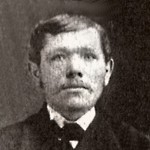 woman he would fall so completely in love with, that they would marry just a year later. I’m sure at that point, Henriette thought back to her prior boyfriend, and decided that their romance was a silly schoolgirl crush. Whoever he was, he could never have measured up to the man Carl was. Henriette wasn’t the same either. She was a world traveler now. She had lived in a wild new country. She had left home, grown up quickly, and had a degree of independence that her old beau would not have understood. Her world was different…things were different…she was different. He would never have been her choice now. Sometimes that is just how it goes. Our lives take turns that we didn’t plan on, and suddenly things are different. Then we have to live our life in the new reality that we live in. I’m sure that is how her mother felt too.
woman he would fall so completely in love with, that they would marry just a year later. I’m sure at that point, Henriette thought back to her prior boyfriend, and decided that their romance was a silly schoolgirl crush. Whoever he was, he could never have measured up to the man Carl was. Henriette wasn’t the same either. She was a world traveler now. She had lived in a wild new country. She had left home, grown up quickly, and had a degree of independence that her old beau would not have understood. Her world was different…things were different…she was different. He would never have been her choice now. Sometimes that is just how it goes. Our lives take turns that we didn’t plan on, and suddenly things are different. Then we have to live our life in the new reality that we live in. I’m sure that is how her mother felt too.

